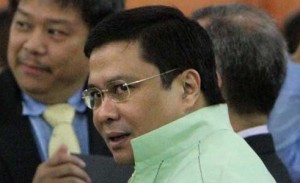MANILA,Philippines–Six prosecutors have pressed the Sandiganbayan anew to immediately transfer Sen. Jinggoy Estrada from the four-room bungalow in Camp Crame where he is currently detained on a plunder case to a regular jail.
In its manifestation with motion before the antigraft court’s Fifth Division, the prosecutors said Estrada’s continued stay at the Philippine National Police Custodial Center had no legal basis and that such special treatment was bad for the justice system.
They said the center, which was originally built as barracks for officials of the PNP Custodial Center Service Unit, is “not a detention facility.”
According to them, the Revised Rules on Criminal Procedure provides that an accused arrested by virtue of a warrant of arrest must be delivered to the nearest police station or jail.
Under Republic Act No. 6975, otherwise known as an Act Establishing the Philippine National Police under a Reorganized Department of Interior and Local Government and for Other Purposes, the Bureau of Jail Management and Penology (BJMP) is the government agency mandated to control and administer the safekeeping of such inmates.
The prosecution described a jail “as a facility or place of confinement undergoing trial and is managed by the BJMP.”
The prosecution also stressed that Estrada was charged with plunder with penalty of reclusion perpetua (life imprisonment) to death, and is also being tried for graft also in connection with the irregular use of his pork barrel allocation as senator, before the court.
Aside from lack of basis, the prosecution said Estrada’s continued stay in Camp Crame afforded him special treatment not enjoyed by others who are similarly situated. It also cited the controversy involving his wedding anniversary party inside the center.
“The special treatment given to him creates a negative image of the country’s court and justice system,” the prosecution said.
“It casts doubt on the government’s capacity to afford equal protection of the law to citizens,” it added.
Estrada has resisted his proposed transfer, saying his continued stay at the facility was not only reasonable, but also necessitated by “security and consideration.”
The motion to transfer Estrada was deemed submitted for resolution of the court on July 31, but Estrada filed a supplemental opposition to the motion to transfer which has been set for oral argument on Aug. 15.
The prosecution, however, insisted that Estrada’s supplemental opposition was improper and lacked merits as the motion to transfer had been deemed submitted for resolution and that oppositions and supplemental oppositions are not required to be set for hearing or oral arguments.
“Setting the supplemental opposition of accused Estrada for hearing/oral argument would serve no legal purpose and would unnecessarily delay the resolution of an incident which was already deemed submitted for resolution on July 31, 2014,” the prosecution stressed.
